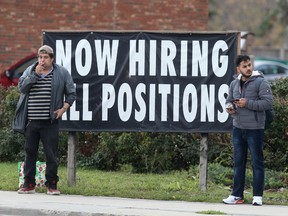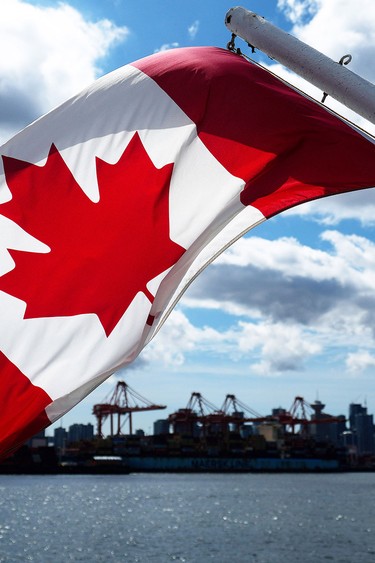But some economists say move a step towards tackling productivity, housing troubles
Article content
Ottawa’s plan to put a cap on the number of temporary foreign residents could “unfairly penalize” industries already facing labour shortages and risk damaging the economy, says one of Canada’s largest business groups, even though some economists say the move is a step towards tackling productivity and housing troubles.
There are currently about 600,000 job vacancies across the country with the restaurant, agriculture, tourism and manufacturing sectors bearing the brunt of the labour crunch, Canadian Chamber of Commerce’s senior director Diana Palmerin-Velasco said.
Advertisement 2
Article content
Article content
“Businesses are very concerned. They don’t know how they are going to operate on a daily basis,” she said. “We have some sectors of our economy that even before the pandemic faced chronic labour shortages and in some cases the pandemic made it worse. We haven’t recovered from that.”
Palmerin-Velasco said the situation is worse in rural areas where hotels, restaurants and fast-food restaurants struggle to find housekeepers, cooks and other workers. She added the government needs to be “very careful” when it comes to immigration since “arbitrarily imposed caps” run the risk of damaging the economy.
While businesses in some sectors may face challenges as a result of the caps, the number of unemployed people in Canada is rising and the labour pressure isn’t as acute as it used to be, said Robert Hogue, an assistant chief economist at the Royal Bank of Canada.
Last week, Prime Minister Justin Trudeau’s government said it will limit the number of temporary residents entering Canada to five per cent of the overall population over the next three years, compared to the existing 6.2 per cent, or 2.5 million students, foreign workers and asylum seekers.
Article content
Advertisement 3
Article content
Canada in January also imposed a two-year cap for new international students and restricted eligibility for work permits for post-graduates and their spouses, and in November decided against increasing the number of permanent residents it wants to bring in from 2026 onward.
Immigration Minister Marc Miller said the ultimate goal is to ensure a well-managed, sustainable immigration system that’s built on the country’s changing needs.
The limitations on newcomers, whom Canada has traditionally relied on to boost its economy, were announced after the country posted record population growth of more than two million people in the past two years, primarily due to a rise in temporary residents.
As a result of the government’s recent decisions, some economists expect Canada’s population growth rate to reduce by two-thirds to around 400,000 annually in a couple of years, compared to last year’s growth of 1.25 million.
Aside from the caps, the government is expected to rely more on temporary residents to select its permanent residents through domestic draws, said Rebekah Young, an economist at the Bank of Nova Scotia.
Advertisement 4
Article content
But curbs on newcomers alone won’t be enough to make housing more accessible or even stable, economists say. Hogue at RBC said Ottawa’s planned cap is a big change, but not a game changer.
“The slower population growth gives the supply side to catch up. Now, if it does, it should help stabilize prices and rents. If it does not, then we may not see that much relief,” he said. “I don’t think the announcement in itself automatically leads to cheaper rent and cheaper home prices.”
James Orlando, an economist at Toronto-Dominion Bank, said the intention behind the latest announcement from Ottawa is to slow the growth of rental and house prices, not to bring them down. If Ottawa introduces further stricter policies, it would still be difficult for people to get access to affordable housing.
“(Affordability) is a challenge which is not going away soon,” he said, pointing to several years of underbuilding supply relative to demand as the underlying cause of the housing shortage.
Economists also hope the proposed cap will help improve productivity numbers, which have been on the decline, since it removes incentives to hire workers from abroad for low-paying jobs in Canada. This practice, they say, discourages businesses from investing in productivity-enhancing technology in favour of cheap labour.
Advertisement 5
Article content
The government allowed businesses to hire more workers from abroad when the job vacancy rate in Canada was at its highest in 2022, but this was undone in the latest announcement, Orlando said.
“They kind of have gotten back to where they were previously. Is it going to be enough to get investment higher? I am not sure, but I am hopeful that they are (going) in the right direction,” he said.
Metrics such as productivity and output per worker are important since they are a signal of the standard of living, economists say.
Canada’s gross domestic product (GDP), which measures the value of goods and services produced during a specific time frame, grew by 0.2 per cent in the fourth quarter of 2023, but its GDP per capita, which divides the GDP figure by population, has declined in five of the past six quarters, economists say.
But Palmerin-Velasco at the Canadian Chamber of Commerce said productivity issues have been hurting Canada for a “long, long time,” so people need to be careful before blaming newcomers for “every issue” the country faces.
Recommended from Editorial
-

Canada to put a cap on temporary residents
-

Newcomers to Canada tone down expectations
-

Student caps may slow rent growth, but won’t solve housing woes
Advertisement 6
Article content
She questioned statements around business’ supposed addiction to “cheap labour” from outside Canada and said businesses don’t look to hire workers from abroad instead of Canadian residents unless they don’t have an option.
“It’s the last resort,” she said, since the process is costly. “I am familiar with the arguments that some economists have put forward, but one thing is how the numbers look like in graphs behind the desk; a very different situation is how they look on the ground.”
• Email: nkarim@postmedia.com
Bookmark our website and support our journalism: Don’t miss the business news you need to know — add financialpost.com to your bookmarks and sign up for our newsletters here.
Article content
Caps on newcomers may ‘unfairly’ hurt businesses, damage economy
2024-03-26 13:17:35








